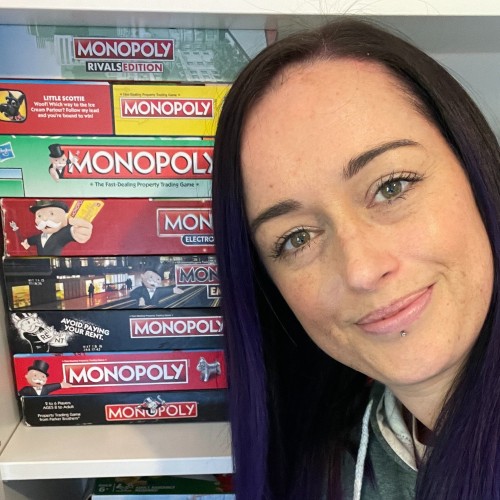So, you’ve overstretched your funds a little too far, making a risky play to build houses on a color set that you own, and it’s backfired with a rent bill you can’t quite cover.
Or maybe you’ve got houses spread across a couple of property sets, and you want to downgrade one to free up funds to upgrade the other.
Either way, it might be time to start selling some of your houses.
In this guide I’ve broken down everything you need to know so you can be sure you’re selling houses as per the Monopoly rules.
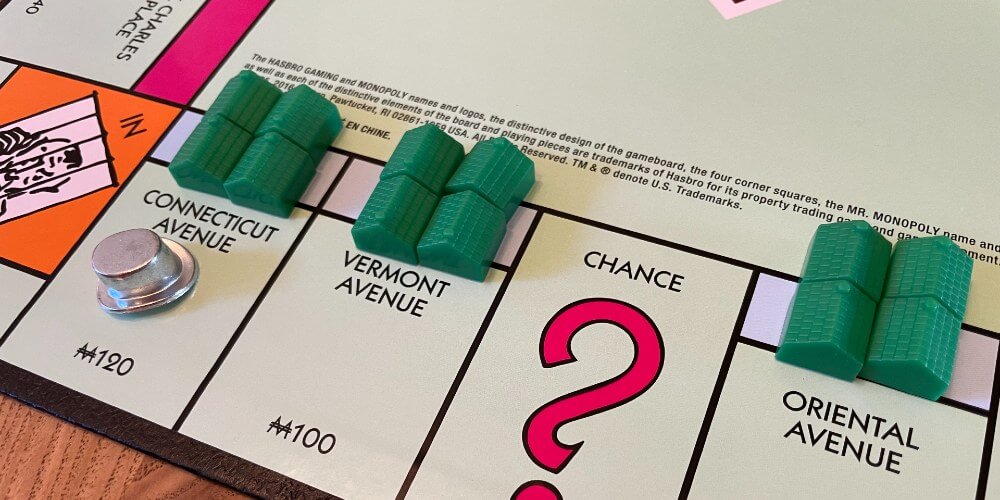
Stuck on buying houses? You can read my guide on that here.
?
Can you sell houses in Monopoly?
You can sell houses in Monopoly if you need to raise some cash. You can only sell them directly to the bank – not to another player. You sell houses for half their original purchase value.
The Monopoly Rules for Selling Houses
How to sell houses in Monopoly
In Monopoly, selling houses is as simple as returning them to the bank, and taking the cash value for the number of houses sold. The house’s sale value is half that of the purchase value. You can sell houses during your turn or in between other players’ turns.
The most common time to sell houses is during your own turn when you land on a property owned by another player and you need to pay rent. However, because you sell houses outright for only half their value, it should be a last resort.
You should always mortgage your other properties before you resort to selling houses.
Mortgaging Properties Vs Selling Houses
For example, let’s say you have a color set with houses, and then a couple of other individual properties that are unmortgaged.
- If you mortgage a property, you’ll get half the value back but you retain ownership of the mortgaged property. You only need to repay that half plus 10% to unmortgage it.
- If you sell a house, you’ll get half the value of the house back. But, to buy it back you’ll need to pay full price again.
You don’t retain any ownership of the house. Selling houses should only be done when you absolutely need to.
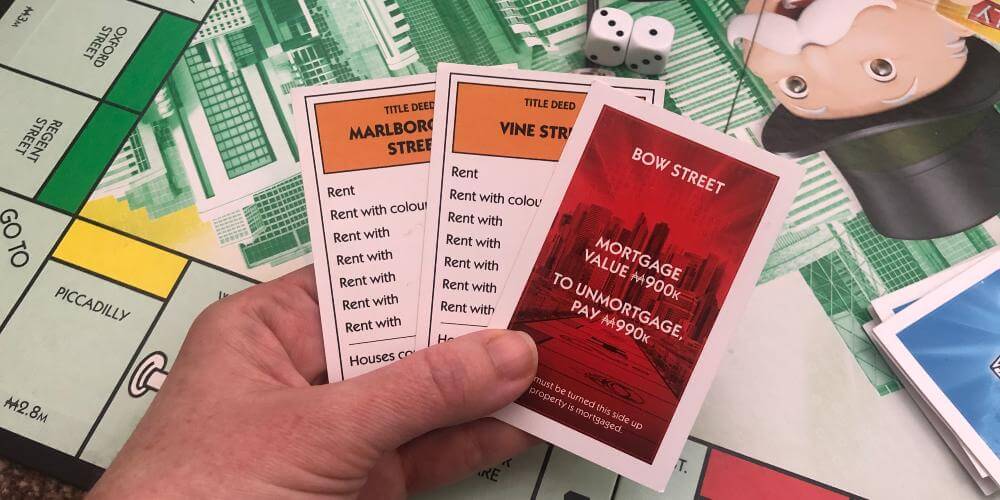
Can you trade houses in Monopoly?
Monopoly houses can’t be traded, and you can’t trade any properties with a house on them. The rules state you have to sell houses before you can trade the property.
It would only be theoretically possible with trading a whole color set anyway – if you trade one property, then neither player would have the monopoly and so houses would be void. But that’s irrelevant since trading whole color sets with houses isn’t allowed.
Suggested read: Monopoly Trading Rules
Can you mortgage houses in Monopoly?
You can’t mortgage houses in Monopoly. You can only sell them, where they are returned to the bank. If you want to mortgage a property that has houses on it, you need to sell the houses first.
This is why you should avoid buying houses you can’t truly afford – because if you then have to quickly sell them, you’ve just thrown money away with no real benefit. It’s what makes the tactics of buying and selling houses so interesting.
How much to sell houses for in Monopoly
Monopoly houses are sold for half the value that they are purchased for:
- Brown – Houses cost $50 to buy, sell for $25
- Light Blue – Houses cost $50 to buy, sell for $25
- Pink – Houses cost $100 to buy, sell for $50
- Orange – Houses cost $100 to buy, sell for $50
- Red – Houses cost $150 to buy, sell for $75
- Yellow – Houses cost $150 to buy, sell for $75
- Green – Houses cost $200 to buy, sell for $100
- Dark Blue – Houses cost $200 to buy, sell for $100
A quick note for anyone playing a video game version of Monopoly – be very careful with the controllers. Often, the buttons for buying and selling houses are close together, and you aren’t asked for confirmation – press the button and you’re selling that house immediately.
You don’t want to accidentally sell a house for half its value because you’ve pressed the wrong thing! This is definitely something I’ve done before, and it can be very frustrating.
Thankfully, selling houses ‘accidentally’ with the physical board game isn’t really possible.
Can you sell houses unevenly in Monopoly?
You can’t sell houses on a single color set unevenly in Monopoly. If you have three houses on each property, you can’t sell two on one of them until you’ve sold one on the others as well. It’s the same rule as when buying houses.
The whole reason you can’t buy and sell houses unevenly is to prevent you from reaching four houses or a hotel too quickly, or with an advantage.
Suggested read: How Many Hotels Can You Have In Monopoly?
If you had the cash to buy four houses on three properties in a set, but could then sell all the houses on two of them, you’d lose money but still have an unfair advantage.
Can you sell individual houses in Monopoly?
You can sell individual houses in Monopoly, as long as you do so evenly. You don’t need to have the same number of houses on each property in a set, but you can’t have a difference of more than one house.
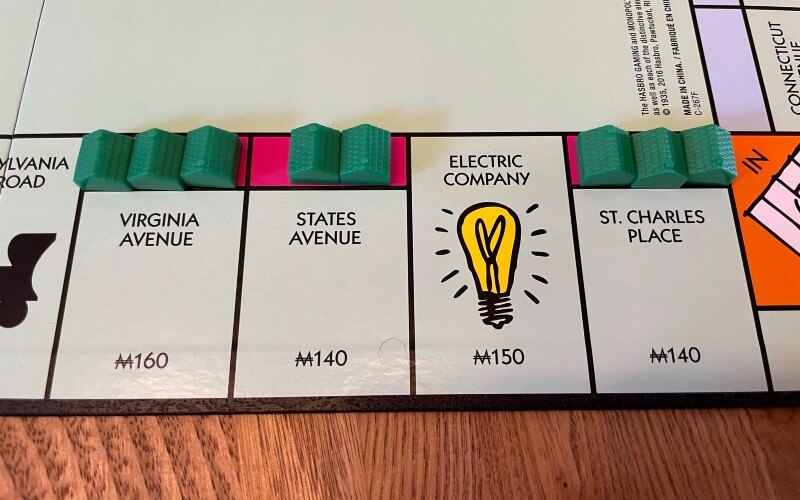
So, if you have three houses on three of your properties. You could sell just one of those houses, leaving you with three houses on two of the properties, and two on the one you sold from.
On your next turn, if you wanted to sell another individual house from that set, it would need to be from the properties that still had three.
What happens when all houses are sold in Monopoly?
When all of the houses are sold by the bank, players are unable to buy anymore until someone sells houses, or until a player goes bankrupt to the bank and their houses are returned.
Later in the game, houses and hotels become precious commodities. If you’re wondering how many houses in Monopoly game boxes, the answer’s 32 – it’s really not that many.
That’s why the last house should always be auctioned. It’s also another reason why you should only sell houses if you have no other choice – you might be giving other players the chance to buy them and build up their own properties.
Of course, if you’ve got a hefty rent bill to pay, then you might not have any other choice.
How to sell hotels in Monopoly
Selling Monopoly hotels works in much the same way as selling houses. You can do so at any time, and you’ll get half the value of the hotel back when you do. You must sell them evenly as well.
When you sell a hotel, you’ll replace it with four houses – you’re essentially downgrading a step on the ladder. So you can’t sell a hotel and a house on one property but leave hotels on the other properties in that set.
It also gets very interesting when there aren’t many houses left in the bank. If you’re forced to sell hotels late in the game, you might end up really losing out on a lot of potential cash.
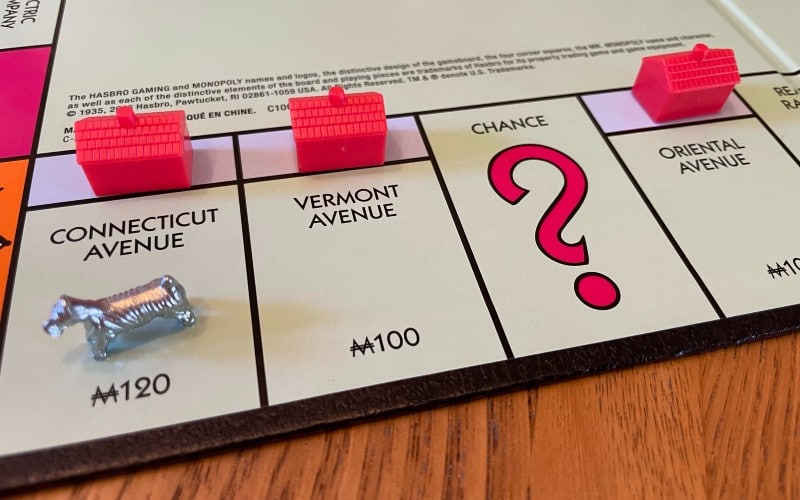
According to this official ruling from Hasbro, you only get money back for the houses and hotels you actually sell back to the bank. But if you have to sell hotels, you can only replace them with the houses available in the bank.
Let’s explain with an example…
You own the Yellows, and you have a hotel on each. Everything else you own is already mortgaged, and you land on Pacific Avenue which also has a hotel on it. You owe $1275. There are only four houses in the bank, and you’ve only got $1000 in cash.
So you sell a hotel. This nets you $75, putting you on $1075 – still short.
The only thing you can now sell is your other hotels – but you can’t replace them with houses, because there are none in the bank. And you can’t sell houses on the property you’ve already sold the hotel on.
Instead, you have to sell all three hotels, and then spread the four houses over the three properties – one each on two of them, and one property gets two houses.
You don’t get the cash value for downgrading from four houses on each either, because you didn’t sell the houses back to the bank. You only sold the hotels.
It gets worse too…
You’ve sold three hotels for a total of $225, putting you on $1225 – still $50 short.
So, you need to then sell one of the houses back for another $75. You’ve suddenly gone from three hotels to a single house on each property, and you’ve got $25 left in cash.
You really want to hope you don’t roll a two on your next turn!
It sounds like an extreme example, but this kind of play is common in games that go the distance. Houses will be snapped up, and big rent payments become regular. Building shortages play a huge role in tactical play when the game has almost run its course.
If someone returns some houses to the bank, it may make sense to sell a hotel even if you’re not under immediate pressure, just to make sure you keep those four houses and don’t end up with a much worse downgrade if you land on a high rent property owned by an opponent.
The Bottom Line
There’s a lot of tactical thinking involved in buying and selling Monopoly houses and hotels at the right time.
Ideally, you’ll never have to sell a house in a game. You shouldn’t rush into buying more houses than you can afford since you’ll just end up losing money when you sell them back for half the value.
Ultimately though, no matter how lucky you are, eventually you’re going to have to sell what you own to pay off a big rent bill, otherwise you’ll end up bankrupt. At least when you do, now you know all the rules so you can play a fair game.

